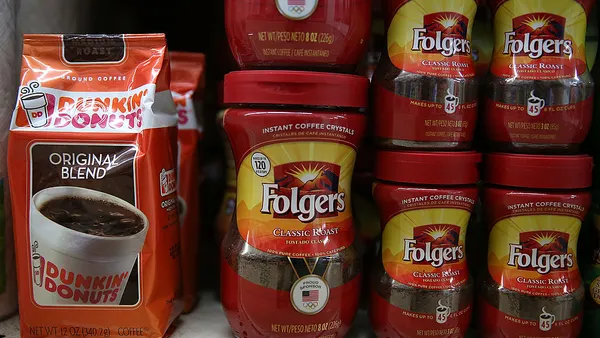Dive Brief:
- Diageo committed to reach net-zero carbon emissions in its owned operations by 2030, the company announced Monday. The beverage giant also pledged to reduce emissions from its supply chain by 50% by 2030.
- The new goals come after the maker of Johnnie Walker, Smirnoff and Guinness reached its existing goals to cut emissions from its direct operations (scope 1) by 50% by 2020 from a 2007 baseline and reduce supply chain emissions by 30% in the same timeframe. Diageo's Scottish distilleries, Oban and Royal Lochnagar, will reach carbon neutrality by the end of 2020, followed by its India operations in 2025, followed by the entire operation in 2030, according to the company.
- The company also pledged to reach 100% widely recyclable or reusable/compostable packaging (currently at 99.5%) and 100% recycled content in plastic packaging (currently at 45%) by 2030.
Dive Insight:
As 2020 rolls into 2021, companies with 2020 sustainability goals must develop their next phase of emissions, water-use and waste-reduction targets.
Beverage makers from Diageo and Pernod Ricard to Coca-Cola and Pepsi have two specific challenges beyond what many other CPG companies face, when it comes to sustainability.
The first is water. Diageo fell slightly short of its 2020 50% improvement in water efficiency this year, reporting a 46% reduction. The company said the shortfall was due to "delayed water recycling projects in Africa and lower packaged volumes in some markets both as a direct result of COVID-19 impacts."
Diageo has pledged to reduce the water used in its production processes for each beverage by 30% by 2030 and achieve what it describes as "a net positive water impact in our key water stressed basins and communities."
The second challenge for beverage producers is that their products are heavy and require a considerable amount of fuel per unit to move. Recyclability pledges often complicate emissions reduction work in this category, as highly recyclable glass is heavier than plastic.
Diageo announced in August it would not meet its 2020 goal of reducing packaging weight (to reduce transportation emissions required to move it) by 15%, instead reaching an 11% reduction. Diageo's new packaging goal is to reduce packaging weight by a further 10% and reach 60% recycled packaging content with 100% recyclability by 2030.
Diageo is launching a technology fund to provide non-equity funding to startups to help meet its goals. Chief Sustainability Officer Ewan Andrew told the Financial Times the company is capturing the heat energy produced in the barley malting process to reduce emissions — in one example of the shift toward new technologies in this 2030 phase of sustainability goals for the company.
Diageo plans to partner with and encourage suppliers to reduce their own emissions by encouraging alternative energy conversion, regenerative agriculture and circular design — important moves in order to reduce supply chain emissions (scope 3). The company gauges its suppliers' emissions using CDP's reporting structure. Diageo reported earlier this year that 88% of its 229 suppliers reported emissions to CDP and 51% had emissions reduction targets in place.














